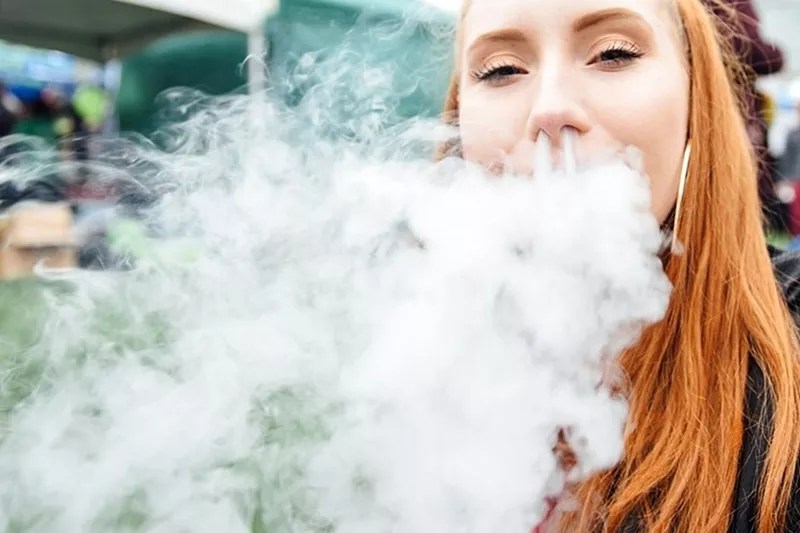
Kenzie Bruce

Audio By Carbonatix
Later this month, Denver City Council is expected to consider whether or not to ban flavored tobacco within the city.
The idea of banning flavored tobacco products might stem from the best of intentions, but in reality, it will do more harm than good. It won’t have the intended impact, and instead will impose high costs for the people of Denver and further strain small businesses and a city struggling with high crime rates and far more urgent problems. It’s a bad deal – and Denver shouldn’t take it.
We’ve been down this road before. In December 2021, then-Mayor Michael Hancock vetoed a similar proposal to ban flavored tobacco, with exceptions for hookahs, pipe tobacco and natural cigars. In 2022, the Colorado House passed a statewide ban on flavored tobacco, only for it to die in the Senate.
Let’s hope that cooler heads prevail once again. As Hancock argued in his 2021 veto message, if a ban became law, then flavored tobacco would simply be purchased outside the city, driven back into Denver, and sold on the street. There would be no significant decline in youth smoking as a result of a ban on flavors.
The only thing that would decline would be revenues to legitimate retailers. Many of these retailers are small businesses, like gas stations, which already have thin margins. A loss in revenue to these retailers could result in job losses or even higher prices for other products. These costs will be paid by all of us, whether we smoke or not.
This is not speculation. It is exactly what has been seen in other cities and states that have tried this approach. When Massachusetts banned flavored tobacco, excise taxes plummeted in the state and created a massive black market for tobacco products. Sales in the neighboring states went up. A flavored tobacco ban cost Massachusetts – and its legal retailers – millions of dollars and enriched criminals instead. There have been similarly dismal results in New York and California, where plenty of kids are still vaping after a flavored tobacco ban.
We don’t need a hit to our economy right now. Denver is already facing a major strain on institutions. We need more business and more economic activity, not less.
There are much better ways to protect kids from illegal tobacco. Colorado already bans all tobacco products for people under 21. We just need to enforce the law. This could be done by conducting more checks to ensure that retailers are requiring an ID for tobacco purchases or by increasing fines for breaking the law.
This resurrected proposal to ban flavored tobacco comes at an ironic time for two reasons. First is that rates of vaping for middle-schoolers and high-schoolers in Colorado have actually dropped in recent years from their peak in 2017. The days when Colorado led the nation in teen vaping are over.
The timing is also ironic because the FDA approved a flavored e-cigarette for the first time as recently as June. Why should something approved for adults by the FDA be banned in Denver?
The proponents of a flavored tobacco ban seem to have good intentions. But they are focused on the wrong problems and using the wrong tactics. Legal, regulated e-cigarettes are less potent than cigarettes and are often used to help people quit smoking. Denver’s proposed ban on flavored tobacco would leave cigarettes perfectly legal while banning a legal, regulated product that could help people quit cigarettes.
The real problem is the easy availability of illegal, unregulated disposable vapes from China. Much like selling tobacco to those under 21, these dangerous products are already illegal. We just need to enforce the law. One way to do this would be to set up a vape registry, ideally statewide. A registry would keep the legal, FDA-approved products on the shelves, while fining retailers who sell unregulated, illegal products, which contain much more nicotine. A registry would steer smokers toward the safer products by making them easier to buy than the more dangerous products. In contrast, a ban on legal flavored tobacco would drive smokers toward a black market and potentially toward the more dangerous, illegal vapes from China.
Good intentions are important, but results matter a lot more. The only thing a flavored tobacco ban would achieve is to hurt Denver’s retailers. To reduce youth vaping, we simply need to enforce the laws we already have. The idea that banning flavored tobacco would stop youth vaping in Denver is just hot air.
Regina Thomson is chairman and president of Americans for America, a nonprofit, nonpartisan citizens alliance based in Colorado that “provides educational programs to protect, defend, and uphold the freedoms that have made the United States the greatest country the world has ever known.”
Westword.com frequently publishes commentaries on matters of interest to the community on weekends; the opinions expressed in these are those of the authors, not Westword. Have one you’d like to submit? Send it to editorial@westword.com, where you can also comment on this piece.